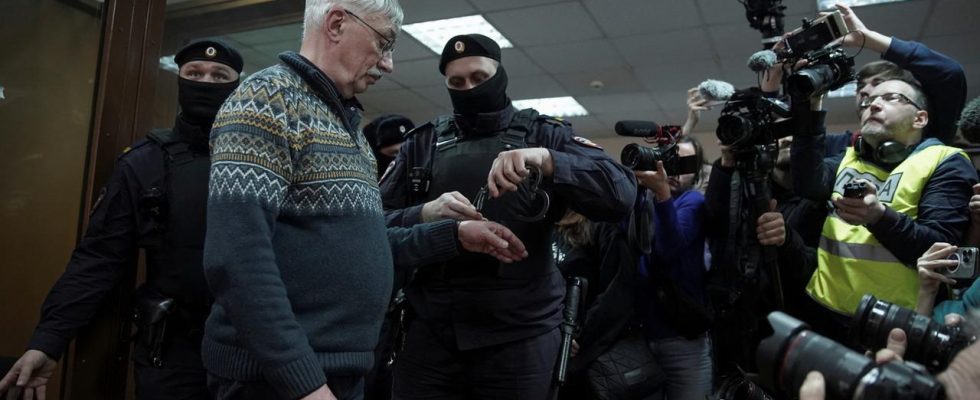Now also Oleg Orlov: A Russian court has sentenced the human rights activist Orlov to a prison sentence of several years – for discrediting the army. In his closing remarks he denounced the conditions in Russia.
The sentence was two years and six months in prison. After all, the public prosecutor’s office had asked for five more months. Russian human rights activist and Kremlin critic Oleg Orlov was arrested in the courtroom. Eight officers led the 70-year-old away.
In his closing statement to the court, he had assumed that the punishment would have something fundamental. “In fact, we are being punished for allowing ourselves to criticize power. In today’s Russia this is absolutely forbidden.”
Fight against forgetting
And Orlov criticized a lot of things in Russia. He is co-chair of Memorial. The human rights organization, founded in 1989, documented the crimes of the former Soviet Union during the communist era for more than 30 years. Russian authorities disbanded Memorial in December 2021.
Just a year later, the organization was awarded the Nobel Peace Prize and Orlov published an article in France. In the article he denounced that Ukrainian civilians were being killed en masse as part of what Russia called a special military operation. That’s why Orlov was fined last year for repeatedly discrediting the Russian army.
In December, a court annulled the verdict and referred the case back to prosecutors. This paved the way for the new trial against Orlov. “This is arbitrariness disguised as formal compliance with some pseudo-legal procedures,” he commented on this procedure in the courtroom.
Another Oppositionist in custody
So far, Orlov has been one of the few Russian opposition figures not in prison or in exile.
Not only public criticism is prohibited, but also any independent assessment. Punishment can follow for actions that appear to have nothing at all to do with politics or criticism of the authorities. There is no area of art in which free artistic expression is possible. There are no liberal academic humanities and there is no longer any private life.
Remembering Navalny
Orlov also used his closing statement in the trial, which has now come to an end, to remember the Kremlin critic Alexei Navalny, who recently died under unclear circumstances, and to pay tribute to all those who mourn him.
In recent days, people have been arrested, punished or even imprisoned simply for coming to the monuments to the victims of political repression to honor the murdered Alexei Navalny, a wonderful, courageous, honest person who did not give up optimism in incredibly difficult circumstances and lost faith in the future of our country.
Orlov can try to challenge the sentence now imposed on him. How promising a revision is is questionable.
Björn Blaschke, ARD Moscow, currently Tbilisi, tagesschau, February 27, 2024 11:56 a.m

